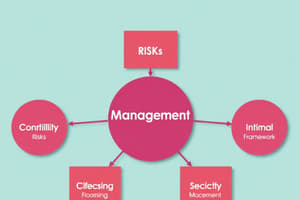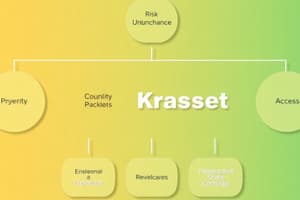Podcast
Questions and Answers
It is critical that management act unclearly and inconsistently in the promotion of proper conduct.
It is critical that management act unclearly and inconsistently in the promotion of proper conduct.
False (B)
Examples of unethical behavior include undue emphasis on bottom-line performance and high-pressure sales tactics.
Examples of unethical behavior include undue emphasis on bottom-line performance and high-pressure sales tactics.
True (A)
Ruthless negotiations and disclosure of the true features of products and services to customers are always acceptable practices.
Ruthless negotiations and disclosure of the true features of products and services to customers are always acceptable practices.
False (B)
Kickbacks or bribes are acceptable business practices.
Kickbacks or bribes are acceptable business practices.
The anti-bribery law only applies within a country's borders.
The anti-bribery law only applies within a country's borders.
Management's primary goal should be to maximize profits, regardless of the cost.
Management's primary goal should be to maximize profits, regardless of the cost.
Sales practices should focus on extracting funds from customers at any cost.
Sales practices should focus on extracting funds from customers at any cost.
The anti-bribery law has only one key element.
The anti-bribery law has only one key element.
COSO's primary goal is to improve the quality of financial reporting through a focus on fraud deterrence.
COSO's primary goal is to improve the quality of financial reporting through a focus on fraud deterrence.
The Control Environment is a component of the COSO framework that deals with the monitoring of internal control activities.
The Control Environment is a component of the COSO framework that deals with the monitoring of internal control activities.
COSO's framework only applies to reporting objectives.
COSO's framework only applies to reporting objectives.
The COSO framework emphasizes the importance of ethical practices in the workplace.
The COSO framework emphasizes the importance of ethical practices in the workplace.
The Control Environment is a critical component of the COSO framework because it sets the tone for the organization's ethical culture.
The Control Environment is a critical component of the COSO framework because it sets the tone for the organization's ethical culture.
COSO's framework is only applicable to large corporations.
COSO's framework is only applicable to large corporations.
COSO's framework consists of five components, including Control Environment and Monitoring Activities.
COSO's framework consists of five components, including Control Environment and Monitoring Activities.
Acting ethically can result in financial benefits for an organization.
Acting ethically can result in financial benefits for an organization.
According to the control framework, management should communicate clearly and consistently to set expectations for employees.
According to the control framework, management should communicate clearly and consistently to set expectations for employees.
Having a code of conduct is not necessary for a company.
Having a code of conduct is not necessary for a company.
Employees should only receive training on the code of ethics and conduct upon initial hire.
Employees should only receive training on the code of ethics and conduct upon initial hire.
Management's behavior has no impact on employees' behavior.
Management's behavior has no impact on employees' behavior.
Record keeping is not necessary to verify that illicit payments were not made.
Record keeping is not necessary to verify that illicit payments were not made.
Control frameworks do not include risk assessment.
Control frameworks do not include risk assessment.
New employees do not need to sign-off on the code of ethics and conduct upon hire.
New employees do not need to sign-off on the code of ethics and conduct upon hire.
Training on the code of ethics and conduct is only necessary for new employees.
Training on the code of ethics and conduct is only necessary for new employees.
The control framework consists of the management practices that ensure accuracy and transparency in all transactions.
The control framework consists of the management practices that ensure accuracy and transparency in all transactions.
The principles underlying the control environment include a commitment to integrity and ethical values.
The principles underlying the control environment include a commitment to integrity and ethical values.
The board of directors is only responsible for overseeing the development of internal control.
The board of directors is only responsible for overseeing the development of internal control.
Reconciliations can be considered complete even if the figures are forced to tie through the use of 'plugs'.
Reconciliations can be considered complete even if the figures are forced to tie through the use of 'plugs'.
The audit committee of the board should not be independent from management.
The audit committee of the board should not be independent from management.
Control activities include reviewing and approving transactions.
Control activities include reviewing and approving transactions.
The control environment includes the monitoring of internal control.
The control environment includes the monitoring of internal control.
The organization's commitment to integrity and ethical values is demonstrated through punishing unethical behavior.
The organization's commitment to integrity and ethical values is demonstrated through punishing unethical behavior.
The company's risk assessment methodology is a key area of interest in the information and communication control category.
The company's risk assessment methodology is a key area of interest in the information and communication control category.
The control environment includes policies that address significant business control and risk management practices.
The control environment includes policies that address significant business control and risk management practices.
The extent of controls over centralized processing is not a key area of interest in the monitoring control category.
The extent of controls over centralized processing is not a key area of interest in the monitoring control category.
The whistle-blower hotline is not a key area of interest in the risk assessment control category.
The whistle-blower hotline is not a key area of interest in the risk assessment control category.
The internal audit function is not a key area of interest in the control environment category.
The internal audit function is not a key area of interest in the control environment category.
The tone set by the board of directors is not a key area of interest in the information and communication control category.
The tone set by the board of directors is not a key area of interest in the information and communication control category.
The company's disclosure committee is not a key area of interest in the control activities category.
The company's disclosure committee is not a key area of interest in the control activities category.
The IT environment is not a key area of interest in the control environment category.
The IT environment is not a key area of interest in the control environment category.
Flashcards
COSO Goals
COSO Goals
Improve financial reporting quality through governance and ethical practices.
Effective Internal Control
Effective Internal Control
Achieved by applying all COSO principles to operations, reporting, and compliance.
Control Environment
Control Environment
The workplace atmosphere shaped by structure, leadership, and ethics.
Management's Responsibility
Management's Responsibility
Signup and view all the flashcards
Undue Performance Emphasis
Undue Performance Emphasis
Signup and view all the flashcards
High-Pressure Sales Tactics
High-Pressure Sales Tactics
Signup and view all the flashcards
Kickbacks and Bribes
Kickbacks and Bribes
Signup and view all the flashcards
Clear Communication
Clear Communication
Signup and view all the flashcards
Walking the Talk
Walking the Talk
Signup and view all the flashcards
Code of Ethics
Code of Ethics
Signup and view all the flashcards
Employee Training
Employee Training
Signup and view all the flashcards
Form over Substance
Form over Substance
Signup and view all the flashcards
Example of Form over Substance
Example of Form over Substance
Signup and view all the flashcards
Integrity Commitment
Integrity Commitment
Signup and view all the flashcards
Board Independence
Board Independence
Signup and view all the flashcards
Key Responsibilities of the Board
Key Responsibilities of the Board
Signup and view all the flashcards
Entity Level Controls
Entity Level Controls
Signup and view all the flashcards
Policies on Risk Management
Policies on Risk Management
Signup and view all the flashcards
Fraud Prevention Controls
Fraud Prevention Controls
Signup and view all the flashcards
Internal Audit Function
Internal Audit Function
Signup and view all the flashcards
Whistle-blower Hotline
Whistle-blower Hotline
Signup and view all the flashcards
Adherence to Code of Conduct
Adherence to Code of Conduct
Signup and view all the flashcards
Organizational Structure
Organizational Structure
Signup and view all the flashcards
Leadership Style
Leadership Style
Signup and view all the flashcards
Openness in Management
Openness in Management
Signup and view all the flashcards
Ethical Practices
Ethical Practices
Signup and view all the flashcards
Conflict of Interest Statement
Conflict of Interest Statement
Signup and view all the flashcards
Study Notes
Control Frameworks
- COSO's goal is to improve financial reporting quality by focusing on corporate governance, ethical practices, and internal control
- COSO states that an entity can achieve effective internal control by applying all principles, which apply to operations, reporting, and compliance objectives
Control Environment
- Refers to the workplace environment characterized by the organization's structure, leadership, openness, management's operating style, and code of ethics and values
- Management's behavior and actions should promote proper conduct, ethical practices, and cooperation
- Examples of unethical behavior to watch out for:
- Undue emphasis on bottom-line performance
- High-pressure sales tactics
- Kickbacks or bribes
Communication, Consistency, and Belief in the Message
- Management should communicate clearly, consistently, and often what is allowed and what is not
- Clear expectations will be more likely followed if management "walks the talk" and demonstrates their beliefs through actions
- Importance of having a code of ethics, code of conduct, and conflict of interest statement
- New employees should receive these documents upon hire and sign-off, and training should be required to ensure employees understand the documents
Form over Substance
- Management practices that appear to follow essential activities but do not actually perform them
- Examples include signatures that suggest transaction review and approval without actual review, and reconciliations that are not mathematically correct
Principles Underlying the Control Environment
- The organization should demonstrate a commitment to integrity and ethical values through actions and rewarding ethical behavior
- The board of directors should demonstrate independence from management and exercise oversight of internal control development and performance
- Key responsibilities of the board include setting expectations for management, authorizing investments, and looking out for the company's owners' interests
Entity Level Controls
- Typical areas of interest include:
- Policies addressing significant business control and risk management practices
- Extent and quality of policies and procedures related to governance, operations, risk management, control, and compliance
- Hiring and retention practices
- Fraud prevention and detection controls
- Competence and scope of internal audit function
- Effectiveness of whistle-blower hotline and adherence to code of conduct
Studying That Suits You
Use AI to generate personalized quizzes and flashcards to suit your learning preferences.




